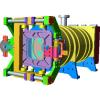Science & Technology
- <p>More than 350 engineering students at the University of Colorado Boulder will demonstrate their innovations and inventions to the community at the annual fall Engineering Design Expo on Saturday, Dec. 7.</p>
- <p>A new National Research Council report calls for the development of an early warning system that could help society better anticipate sudden changes resulting from climate change and their impacts on society, says a University of Colorado Boulder faculty member who chaired the committee that produced the report.</p>
 <p>It’s hard to imagine, but 50 years ago it wasn’t TV, the Internet, Twitter or a myriad of social media that alerted people to breaking news, instead they probably heard it on the radio. But that all changed one afternoon in Dallas, Nov. 22, 1963, when President John F. Kennedy was assassinated. That’s when people discovered the power of live TV, says Rick Stevens, a professor of journalism at CU-Boulder.</p>
<p>It’s hard to imagine, but 50 years ago it wasn’t TV, the Internet, Twitter or a myriad of social media that alerted people to breaking news, instead they probably heard it on the radio. But that all changed one afternoon in Dallas, Nov. 22, 1963, when President John F. Kennedy was assassinated. That’s when people discovered the power of live TV, says Rick Stevens, a professor of journalism at CU-Boulder.</p> <p>While young children sleep, connections between the left and the right hemispheres of their brain strengthen, which may help brain functions mature, according to a new study by the University of Colorado Boulder.</p>
<p>While young children sleep, connections between the left and the right hemispheres of their brain strengthen, which may help brain functions mature, according to a new study by the University of Colorado Boulder.</p>
<p>The research team—led by Salome Kurth, a postdoctoral researcher, and Monique LeBourgeois, assistant professor in integrative physiology—used electroencephalograms, or EEGs, to measure the brain activity of eight sleeping children multiple times at the ages of 2, 3 and 5 years.</p> <p>The University of Colorado Boulder Leeds School of Business will present its 49th annual Colorado Business Economic Outlook Forum on Monday, Dec. 9, at 1 p.m. at the Denver Marriott City Center. The event is free and open to the public but <a href="http://www.eventbrite.com/e/2014-colorado-business-economic-outlook-forum-registration-8721912475">reservations are required</a> for those planning to attend.</p>
<p>The University of Colorado Boulder Leeds School of Business will present its 49th annual Colorado Business Economic Outlook Forum on Monday, Dec. 9, at 1 p.m. at the Denver Marriott City Center. The event is free and open to the public but <a href="http://www.eventbrite.com/e/2014-colorado-business-economic-outlook-forum-registration-8721912475">reservations are required</a> for those planning to attend.</p>
<p>Leeds School economist Richard Wobbekind will present the forecast and Doug Suttles, president and CEO of Encana, will deliver the keynote address.</p>- <p>A $671 million NASA mission to Mars led by the University of Colorado Boulder thundered into the sky today from Cape Canaveral, Fla., at 1:28 p.m. EST, the first step on its 10-month journey to Mars.</p>
<p>Known as the Mars Atmosphere and Volatile EvolutioN mission, the MAVEN spacecraft was launched aboard an Atlas V rocket provided by United Launch Alliance of Centennial, Colo. The mission will target the role the loss of atmospheric gases played in changing Mars from a warm, wet and possibly habitable planet for life to the cold dry and inhospitable planet it appears to be today.</p>  <p>A $5 million instrument designed and built by the University of Colorado Boulder to study the sun’s natural variability in order to better discern human-caused climate effects will be launched Nov. 19 from NASA’s Wallops Island Flight Facility in Virginia.</p>
<p>A $5 million instrument designed and built by the University of Colorado Boulder to study the sun’s natural variability in order to better discern human-caused climate effects will be launched Nov. 19 from NASA’s Wallops Island Flight Facility in Virginia.</p>
<p>The instrument, known as the Total Irradiance Monitor, or TIM, will fly on the National Oceanic and Atmospheric Administration’s Total Solar Irradiance Calibration Transfer Experiment, or TCTE. The principal investigator for the TIM instrument is Greg Kopp of CU-Boulder’s Laboratory for Atmospheric and Space Physics.</p>- <p>A $671 million NASA mission to Mars being led by the University of Colorado Boulder is approaching its official countdown toward a planned Nov. 18 launch after a decade of rigorous work by faculty, professionals, staff and students.</p>
 <p>Learn more about the MAVEN mission from this conversation with the instrument manager for the Remote Sensing Package, Mark Lankton.</p>
<p>Learn more about the MAVEN mission from this conversation with the instrument manager for the Remote Sensing Package, Mark Lankton.</p>- <p>University of Colorado Boulder physics Professor Steven Pollock has been named a <a href="http://www.usprofessorsoftheyear.org/">2013 U.S. Professor of the Year</a> by the Carnegie Foundation for the Advancement of Teaching and the Council for Advancement and Support of Education.</p>
<p>Pollock is the second CU-Boulder faculty member to win a national Professor of the Year award. Nobel laureate Carl Wieman, also a physics professor, was honored with the designation in 2004.</p>


